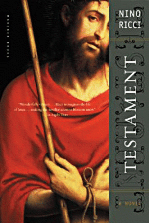It is always a treat to see what fiction writers can do with the life and ministry of Jesus of Nazareth. In Quarantine, Jim Crace chose to focus on his 40 days in the wilderness. Nino Ricci (Lives of the Saints) paints a much broader canvas in this bold and engaging narrative that is rendered through the words of four people who knew Yeshua. For each of them, he is a charismatic teacher who takes their breath away and makes them feel differently about themselves. This Jesus was born a bastard and forced to deal with that stigma. He was educated in Alexandria where he picked up many cosmopolitan ideas and ideals espoused by the Greeks. In a climate of political turmoil, he moves freely among all giving them a taste of the kingdom of God.
The first section of this historical novel is narrated by Yihuda of Qiryat (Judas). Yeshua is portrayed as a compelling teacher who is able to reach peasants and tax collectors alike with his stories of transformation. Yihuda, a political dissident, has his own ideas about change. He finds himself in a quandary: “Thus when I considered what it was in Yeshua that had held me to him, it seemed exactly the hope of something new: a new sort of man, a new way of seeing things. I thought, If there was a single person who had found the way to speak the truth, perhaps the rest was worthwhile; if there was someone whose vision was truly more than hope for his own gain or greater glory, then perhaps God has not made us simply animals, a pestilence the world would be well rid of. . . Tell me your secret I had wanted to say to him, tell me, make me new.”
The same yearning is expressed in another voice, that of Miryam of Migdal (Mary Magdalene). She is moved by the attention that Yeshua gives to her; during a simple talk on the beach he is present with her in a way that no other person has ever been. She is totally taken with this spiritual teacher. And here, in her words, is the reason: “But over time it seemed the questions had come down to a single one, which was what manner of man was this, to so affect me, that I would have abandoned every desire had he asked it of me except the one, which was to be near him. Even his enemies granted the power of him, if only in the force with which they opposed him; for if what he said was nothing, as they claimed, and made no logic or sense, they would merely have dismissed him with their silence and not their shouts. Thus it was that everyone who heard him or laid eyes on him formed an image of him, and believed him a holy man or a madman, a heretic or a sage, with deepest certainty.”
These two sections work the best in Ricci’s portrait of Yeshua since they are animated by the immensity of the desire of Judas and Mary Magdalene. The other two narratives are of those of Miryam (Mary), the mother of Yeshua, and Simon of Gergesa, a young Syrian shepherd who is on hand in Jerusalem during the prophet’s final days. Testament beautifully conveys the importance of yearning not only in these four characters but also in Jesus who never abandoned his desire.
